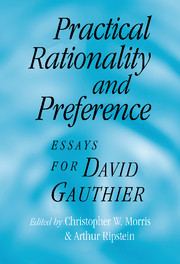Book contents
- Frontmatter
- Contents
- List of Contributors
- Practical Reason and Preference
- What Do Expressions of Preference Express?
- Preference
- Rational Temptation
- Bombs and Coconuts, or Rational Irrationality
- Are Intentions Reasons? And How Should We Cope with Incommensurable Values?
- Two Forms of Practical Generality
- Psychology for Cooperators
- Which Games Should Constrained Maximizers Play?
- The Strategy of Cooperation
- We Were Never in Paradise
What Do Expressions of Preference Express?
Published online by Cambridge University Press: 11 January 2010
- Frontmatter
- Contents
- List of Contributors
- Practical Reason and Preference
- What Do Expressions of Preference Express?
- Preference
- Rational Temptation
- Bombs and Coconuts, or Rational Irrationality
- Are Intentions Reasons? And How Should We Cope with Incommensurable Values?
- Two Forms of Practical Generality
- Psychology for Cooperators
- Which Games Should Constrained Maximizers Play?
- The Strategy of Cooperation
- We Were Never in Paradise
Summary
Actions, Reasons, and Preferences
Some, but not all, of our behavior deserves to be called ‘action’. We distinguish, among our doings in a broad sense, a special class of performances that are both doings and (therefore) ours in a richer and more demanding sense. Action is behavior that is rational, in the sense that the question of what reasons can be given for actions is always, at least in principle, in order. Actions are performances that are caught up in our practices of giving and asking for reasons as moves for which reasons can be proffered and sought. Although there may be much more to the concept of action than is captured in this characterization, the connection between action and reasons is sufficiently tight that one cannot count as understanding the concept of action (as even minimally mastering the use of that and cognate words) unless one also counts as in the same sense understanding the concept of reasons (for action).
One specifies a potential reason for an action by associating with the performance a goal or an end: a kind of state of affairs at which one understands it as aiming, in the sense that its success or failure is to be assessed accordingly as it does or does not bring about a state of affairs of that kind. Because this is the form of reasons for action, actions, as essentially performances for which reasons can be offered or demanded, are also essentially performances whose success or failure can be assessed.
- Type
- Chapter
- Information
- Practical Rationality and PreferenceEssays for David Gauthier, pp. 11 - 36Publisher: Cambridge University PressPrint publication year: 2001
- 2
- Cited by



